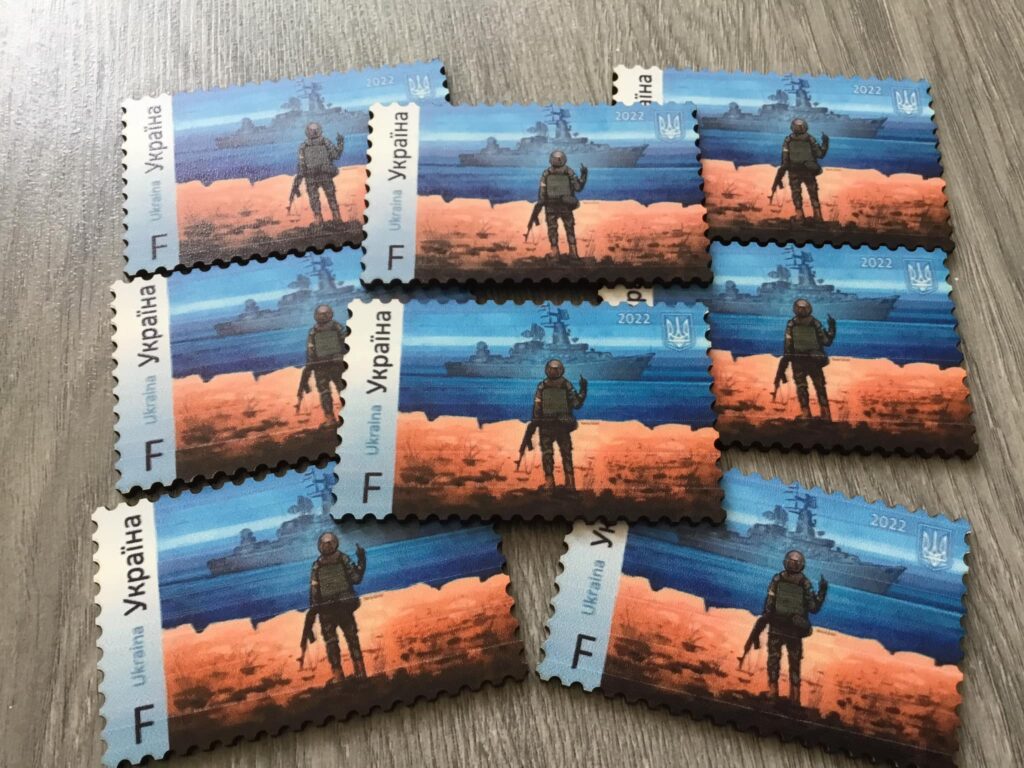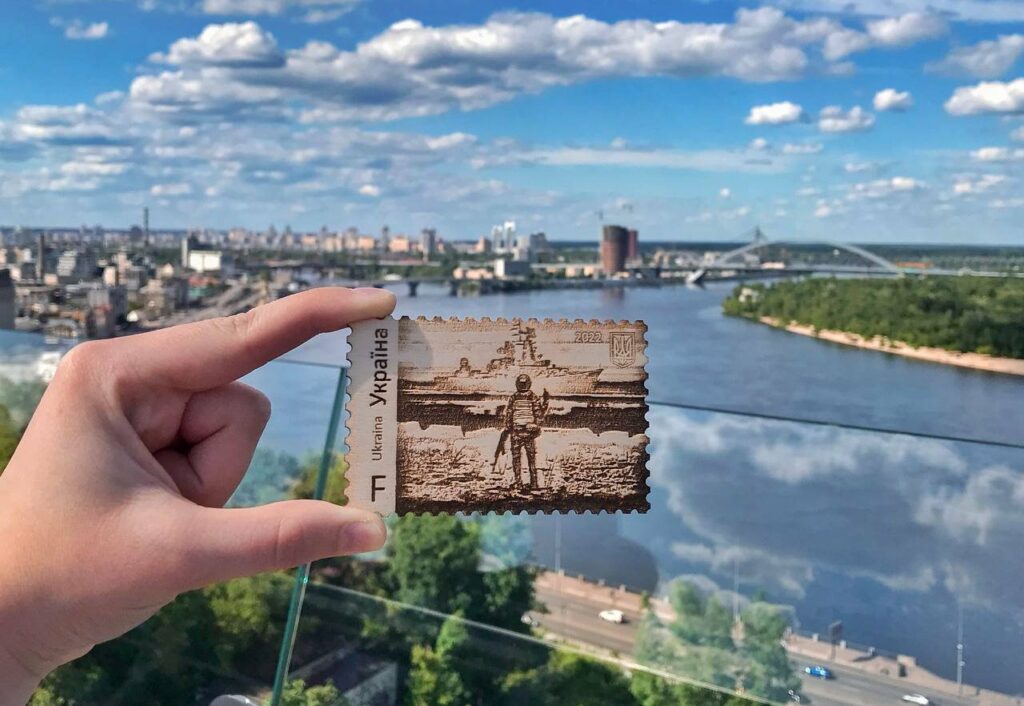In Soviet Ukraine, the Donetsk region was associated with rugged miners and metallurgists. So rugged that there was a saying: “Donbas never talks nonsense.” The fact that business was developing in the region was of secondary importance. Meanwhile, entrepreneurs actively conquered markets, and this trend did not stop after some territories were occupied in 2014.
The local government supported private initiative as much as they could. They planned to expand the innovation and production territorial cluster by defining three centers: the northern one with its center in the Kramatorsk city territorial community; the central one with its center in Kurakhivka city territorial community; the southern one with the center in the Mariupol city territorial community.
The project of the regional program of financial support for small and medium-sized enterprises “Consolidation of entrepreneurship in the Donetsk region” was supposed to help in such areas as introduction of alternative energy sources, cultivation of agricultural crops in greenhouses and hothouses, production and processing of agricultural crops, foodstuffs, organization of waste processing, mechanical engineering, manufacturing of machines and equipment.
The full-scale Russian invasion changed those plans, but even after leaving the region, people of the Donetsk region continue doing what they did before. And there are a lot of examples like the ones we are going to tell you about.
Marie & Paul toy factory – without Mariupol to Dnipro
Ruslana Shcherbyna is a young Mariupol entrepreneur, who founded the Marie & Paul toy factory in 2018.
She named it after her hometown.
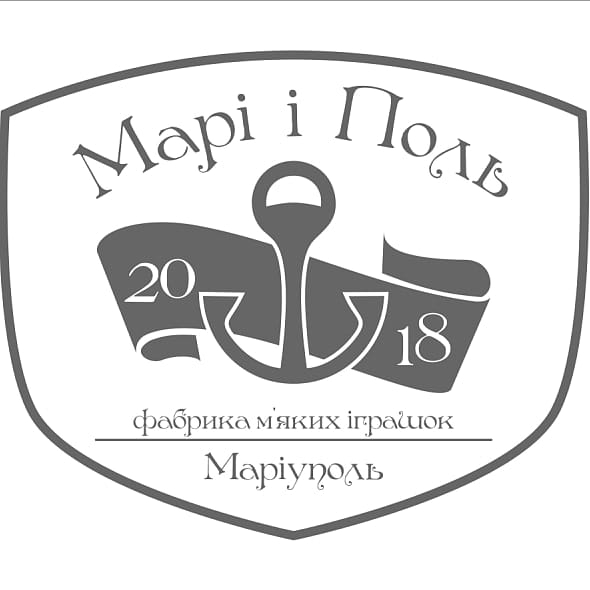
Ruslana has been obsessed with soft toys since childhood, and even as an adult she kept buying herself some new toys. Until she realized that she can sew them herself. While she was developing an idea for a business project, she learned about the competition “Ukrainian Donetsk Kurkul” – that was the name of a program supporting entrepreneurs in the Donetsk region, when money for the establishing or developing was given from the regional and local budgets in the form of a non-refundable grant.

In the summer of 2018, Ruslana successfully defended her business idea and received a grant of almost half a million hryvnias to purchase sewing equipment. She ordered some equipment in China and some in Ukraine. That’s how the Mariupol Marie & Paul toy factory appeared.
Ruslana employed 7 people. They produced soft toys, comfortable pillows for sleep and relaxation, blankets and bed linen for children. In the spring of 2021 they launched clothing manufacturing. Right before the war, the factory invested a large sum of money in the purchase of fabrics and accessories.
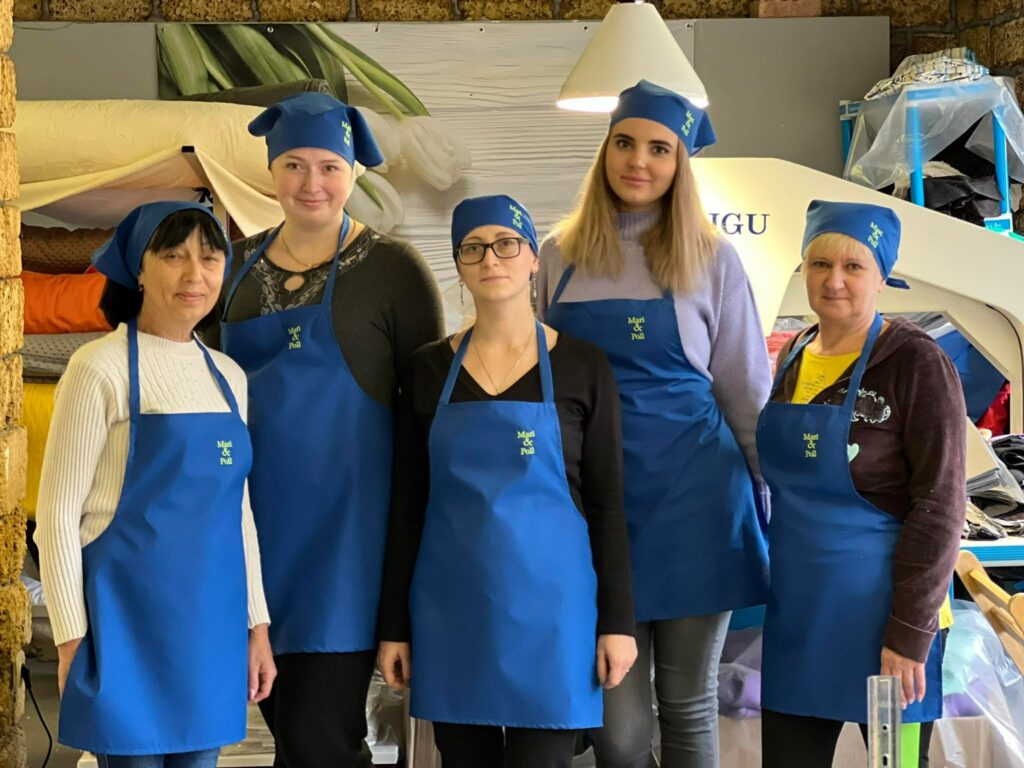
“Marie & Paul is not just a sewing shop. It’s a heartwarming place. When I come here, I become filled with good energy. We love every toy, every piece of fabric, every thread. We talk to our equipment, all products are charged with mega positive energy. We love what we do,” Ruslana Shcherbyna says about her factory.
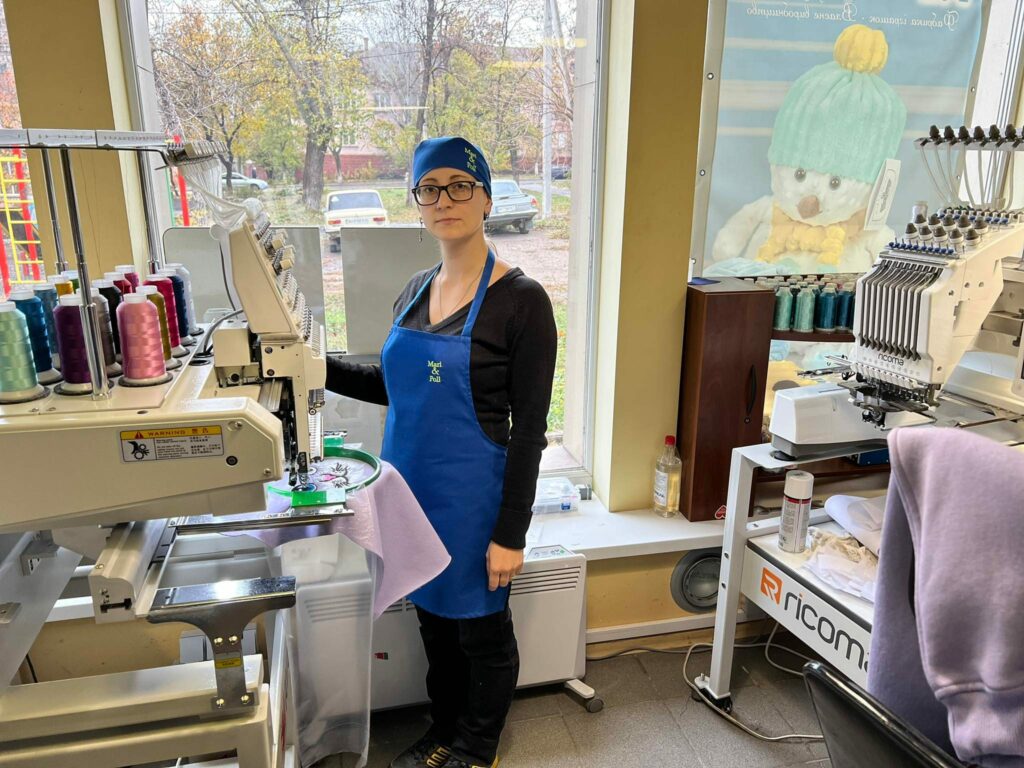
The big war that began on February 24, 2022 thwarted all plans. A day before the full-scale invasion, all of Mariupol was talking about dangers and expectations. Ruslana reassured the staff, because she hoped the trouble would pass them. When a missile fell nearby on the first day of the war, the family hastily packed the most essential things and left – they had to save their three-year-old son from the horrors. They planned to go for a few days to Zaporizhzhia or to her mother in Transcarpathia, so they took a minimum of seasonal clothing, money and documents.
As they were driving, they realized that it was not for a few days. They drove for a long time in an endless stream of cars. When they reached Transcarpathia, they were in a state of shock. None of the factory staff agreed to leave Mariupol. Ruslana was very concerned if everything was okay with them. Especially when she got completely out of touch with Mariupol, where there was no electricity, water, gas or heating. Fortunately, everyone is alive. During a lull and with minimal communication, they managed to inform that all the equipment survived. And when the shelling almost stopped, the women were able to take the equipment from the factory to their homes to keep it safe.
“The building where the factory was located suffered minor damage,” says Ruslana Shcherbyna. The new premises, purchased for the expansion of production, are completely destroyed. The occupants broke into our apartment, took everything away, and left only bare walls. In Mariupol, “nationalization” of the property of those who left and will not return has already begun. I will never collaborate with the occupants. We will return only to Ukrainian Mariupol!”
Ruslana’s family spent a whole month in Transcarpathia, and then decided that they had to move on, do something, not just sit around. They moved to Dnipro, which was closer to home so that they would be able to return after Mariupol is liberated. It was in Dnipro that the entrepreneur decided to revive a factory for sewing toys.
“My name is Ruslana, and at 25 I had a successful sewing business… I had… until February 24, 2022. Everything I had remained in Mariupol, and I don’t know when I can get it back or if I can get it at all. Enough of the sad stuff. I have already accepted the situation and decided to move on. It’s never too late to start. Now I am starting my business from scratch. The Marie & Paul will live on. We will be reborn as a phoenix. I know that for sure. I will take small steps towards the goal every day,” Ruslana wrote on the factory’s Facebook page.
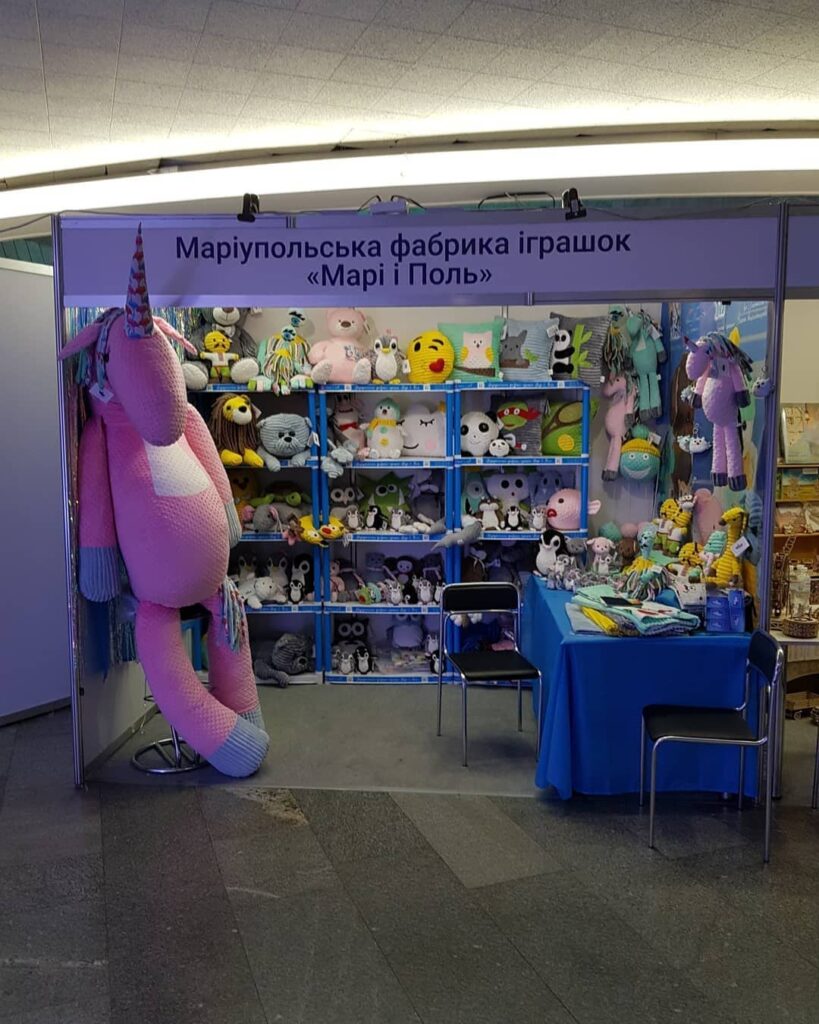
At first, Ruslana turned to the Dnipropetrovsk Regional State Administration, hoping for help within the framework of the program on relocating production from the east. But the RSA suggested she look for another region. Then the woman turned to the city council. She is ready to spend her own savings and buy the most necessary things to start production, but needs support with premises and accommodation of the staff. Her Mariupol seamstresses are ready to leave the occupied city only if there is a job and a place to live.
According to the entrepreneur, there are very many IDPs in Dnipro. By opening a small business, Ruslana will be able to provide work for herself and hire a few people. The woman was invited to a meeting with the deputy mayor. There were entrepreneurs from Kramatorsk, Bakhmut, Kostyantynivka and other towns of the Donetsk region.
“Most of them took their equipment away,” says Ruslana. “It is impossible to take anything out of Mariupol, so my situation is slightly different. But I don’t need much. We are ready to stay in an ordinary room with light, without special conditions.”
After the meeting, things moved along! Premises were promised, Ruslana is already negotiating the purchase of equipment and materials. They are ready to start in a month. If it doesn’t work, she’ll look for another option.
Patriotic souvenirs of WoodLike workshop from Kostyantynivka
WoodLike family workshop opened in Kostyantynivka in 2019. Dmytro Pokolenko, together with his wife Natalia and daughter Maria decided to start producing wooden souvenirs and useful household things.
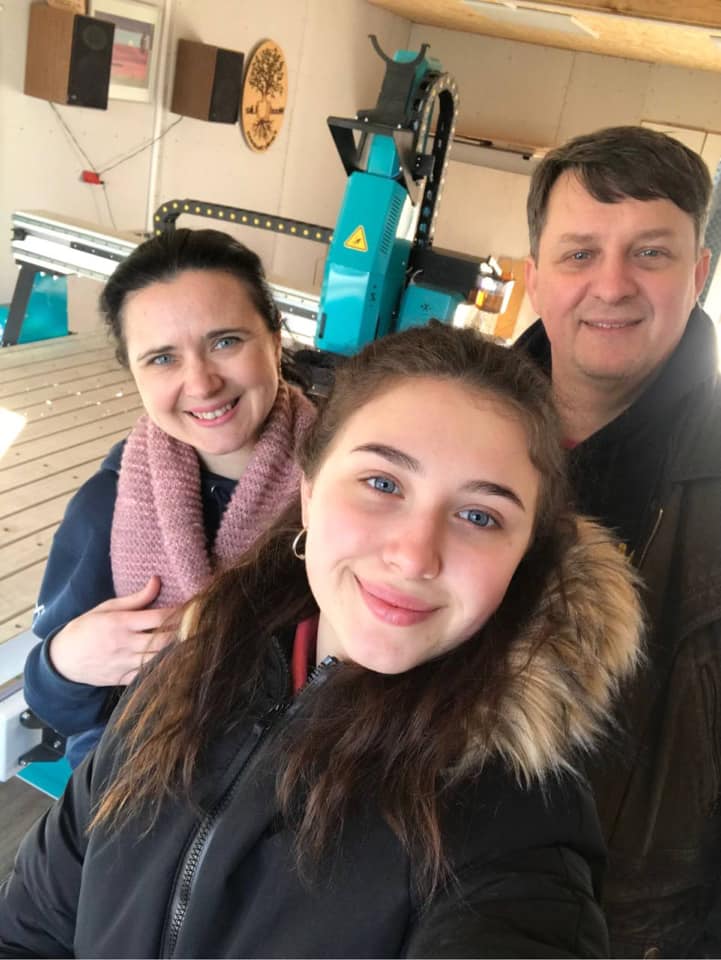
The workshop was built on the same place where Dmytro’s great-grandfather used to make mirror frames. The first equipment was bought with their own savings. Subsequently, they purchased an expensive laser printer and a 3D miller with grant money from various projects. A week before the big war, a 3D miller arrived in Kostyantynivka from the Kyiv region. The equipment had just been installed and was starting to be run-in. It allowed expanding the production, working with solid wood, glass and performing other previously inaccessible works.
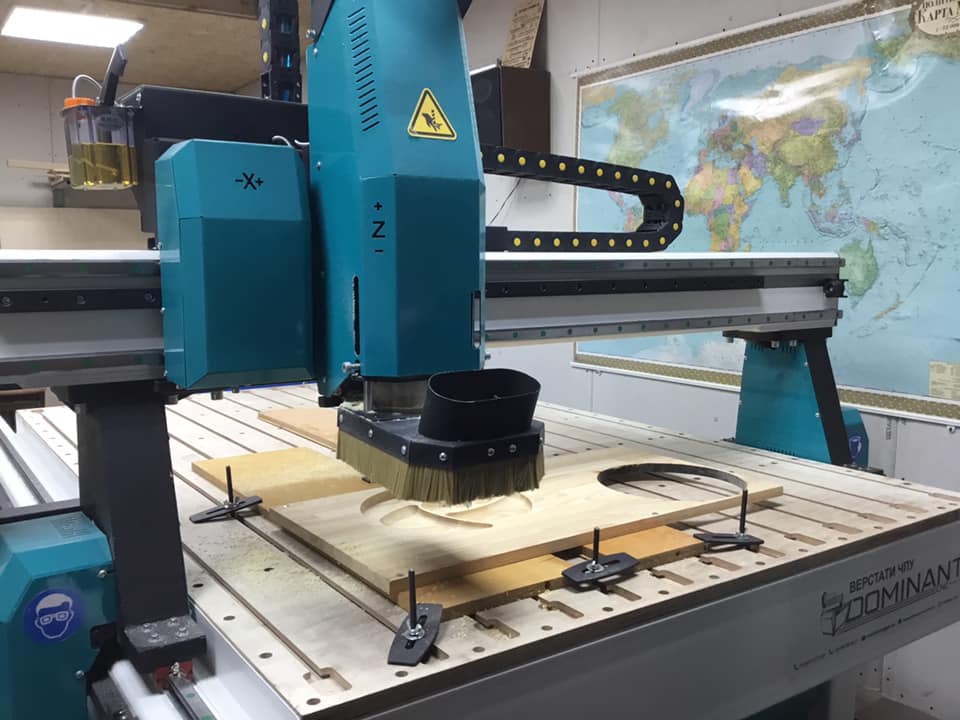
From the very beginning, the WoodLike woodworking shop has positioned itself as a social enterprise. Its owners help social activists in the east, investing part of their profits in the orders of those NGOs.
The business started with an embroidered map of Ukraine. The Ukrainian speaking club Faino from Kramatorsk was preparing for a holiday. Its leader, Oksana Muravlyova, asked the Pokolenko family to make a map, the embroidery of which would unite people according to their common cause. Dmytro worked on the project for two months – that’s how the author’s map made of puzzles, which can be embroidered, appeared. Each region has its pattern. The workshop gave that map to the speaking club for free, and that’s how the social entrepreneurship started.
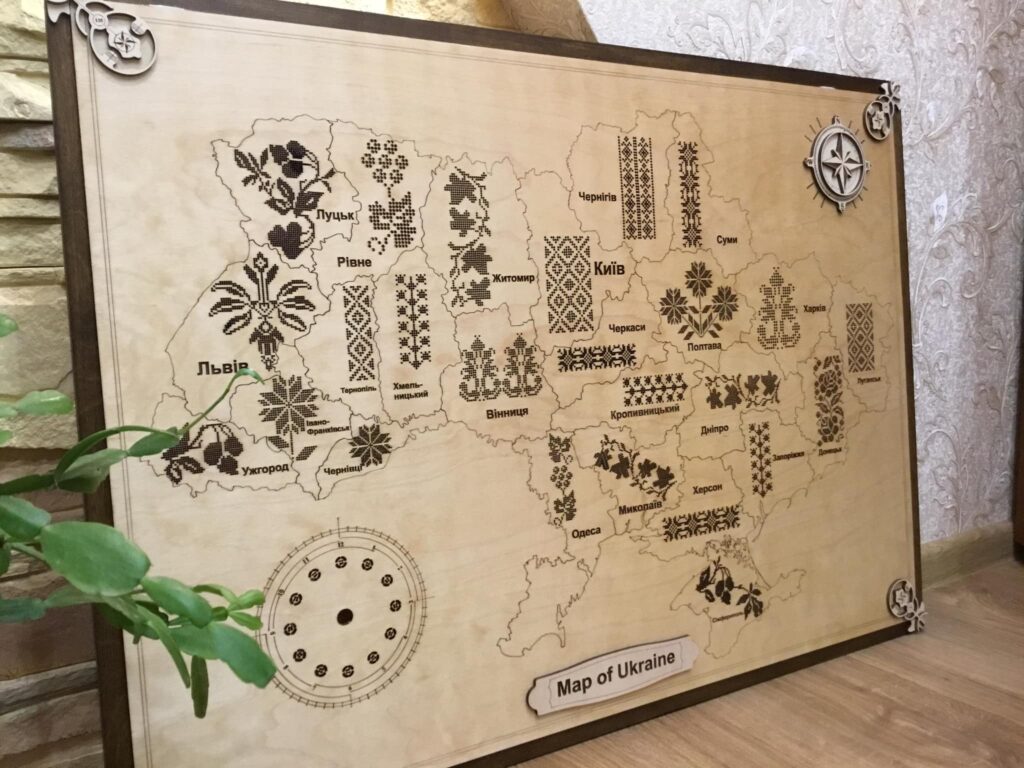
In total, the family workshop produces more than 80 types of souvenirs and useful items. Patriotic symbols – magnets, maps, and key rings are the most popular. The products range includes desks that allow a user to work in standing and laying positions, caskets, a perpetual calendar, napkin holders, cat beds, scramblers, etc. Developmental games are often ordered, and not only for home use, but also for children’s development centers.
In February 2022, the war changed all plans. The workshop ceased to work for its intended purpose: people were in no mood to order souvenirs, and it became impossible to send finished orders to customers from Kostyantynivka. The Pokolenko family focused on helping their hometown. They printed leaflets for free with an appeal to defend Kostyantynivka and to join the ranks of territorial defense. They made signs with addresses of shelters. They cleared those shelters, participated in the construction of protective structures and the production of “Bandera smoothies.”
Eventually, it was time for the Pokolenko family to leave the city. At that time, the regional leadership called for mass evacuation. They took things for a couple of months and went to the Dnipropetrovsk region, hoping to return home before it became warm. Feeling safe, Dmytro and Natalia understood that they could run a business, because patriotic souvenirs would be in demand. They decided to move from the Donetsk region to a place where the workshop could resume production. They hesitated between Dnipro, Kyiv and Lviv. In the end, they chose Kyiv.
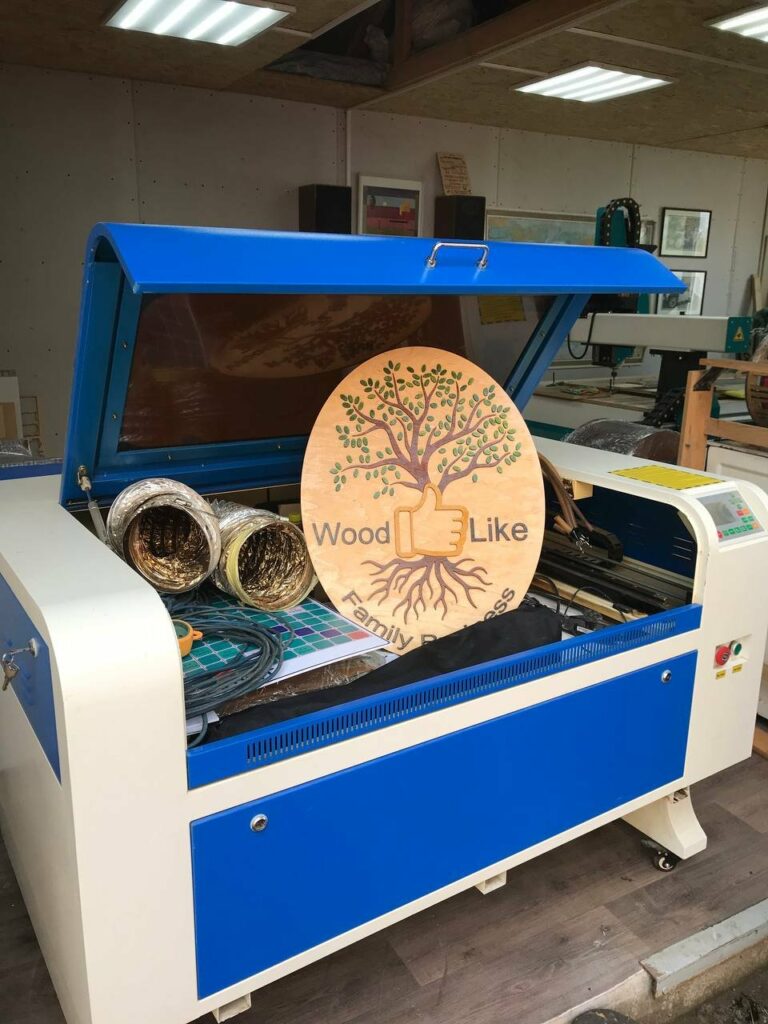
They knew about the relocation program because Natalia works in journalism. They applied for the program, but did not expect quick assistance. During the move, they relied only on themselves. The most difficult thing was to find a truck for transporting the equipment and a loader, without which a 3D milling machine weighing 1.2 tons could not be loaded. Their move coincided with an increase in fuel prices. They agreed on one price in the evening, and in the morning it rose by 30%.
Although they had trouble with the premises for the workshop, they were able to overcome everything. They resumed production in Kyiv from the first day, because they already had orders from customers. They received an answer regarding their relocation already after the move; they were advised to contact the local authorities for support. Now they work every day and not wait until they are given this support.
They expanded the range of patriotic souvenirs, now among them are magnets with the well-known stamp about “russian ship”, tractor troops, etc. They also developed a Mariupol series with colored magnets based on the artist’s drawings. The new milling machine is already being actively used. Souvenirs of the WoodLike workshop are sold on Khreschatyk. 20% of the profit is transferred to the needs of the Armed Forces. Together with volunteers, they help the military who defend the Ukrainian east.
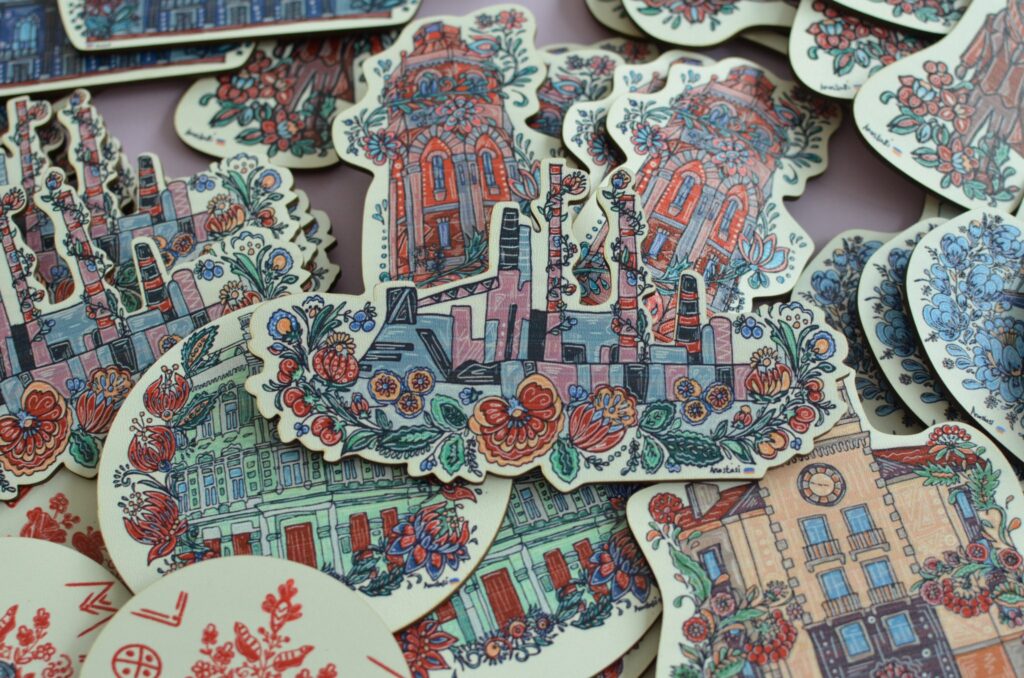
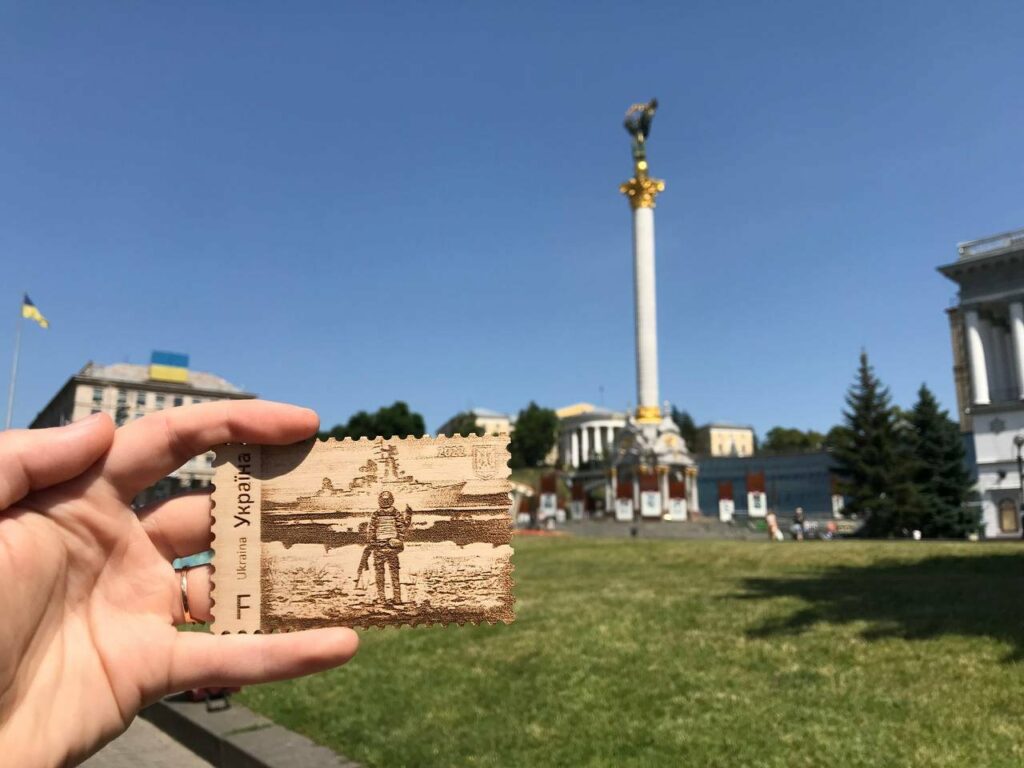
«Моко піца» для біженців та війсь“Moko pizza” for refugees and soldiers in the east
Ihor Vynogradov is an entrepreneur from the Donetsk region. Before the war, he was the owner of the Moko Pizza chain, two in Mariupol, one in Pokrovsk and one in Myrnograd. These pizzerias became a socially responsible business even before the war. During the coronavirus epidemic, Ihor supported doctors who saved lives day and night. He delivered pizza to ambulance doctors in Mariupol and Pokrovsk for free – in this way he thanked the doctors who worked without days off.
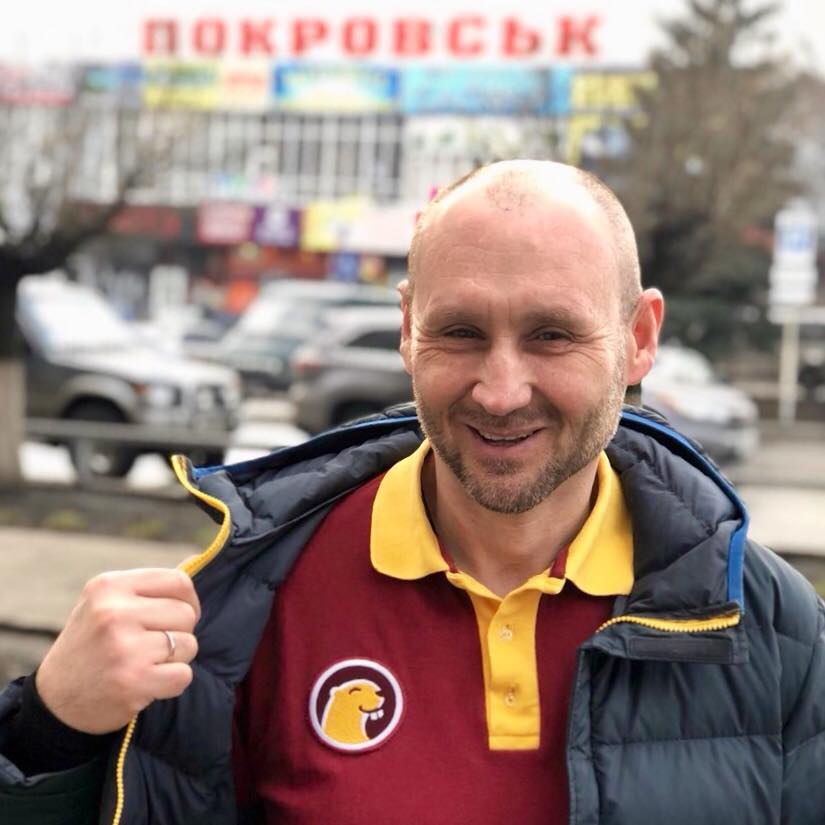
The big war, which began in February 2022, made significant adjustments to the development of Ihor Vynogradov’s business. First, the ruscists destroyed two pizzerias in Mariupol: in the center (the first in the chain) and on the left bank (the entrepreneur opened it with the assistance of the American foundation that had provided a grant of UAH 1.64 million; as a result it became a cool technological facility).
Until the last moment, those pizzerias in Mariupol worked to the roar of explosions, and the manager delivered pizzas to bomb shelters and basements. First, electricity went out, then the city was left without water, heating and communications.
Pizzerias in Pokrovsk and Myrnograd continued to work. It was no longer about business and profits. The task was to simply survive and help others survive. During the war, their work was reframed: they began to bake and deliver pizzas for refugees, hospitals, and send them to the front.
The entrepreneur called on people to contribute to this initiative.
“You can come to Moko, order pizzas and pay for them, and we, in turn, will make and take them to the hospital, to people who became homeless, or to our heroes on the front line. If you cannot come to us, you may transfer money to our account,” Ihor Vynogradov posted on social networks.
Each employee who remained in place began to perform untypical functions. They knew that was the right thing to do. The designer started washing the dishes. The chain manager – went under shelling to Kramatorsk and Dnipro for groceries and then delivered them to the front line. When the couriers did not go to work because of explosions, Ihor and the manager started delivering pizzas themselves.
He realized that he had to remove the equipment to be able to work in a new place. The Myrnograd pizzeria was closed and they intended to transport the equipment to Central Ukraine. The pizzeria in Pokrovsk was supposed to continue working, making pizzas for the military and IDPs. But the situation worsened, and the evacuation of Pokrovsk, which had been more or less calm before, began.
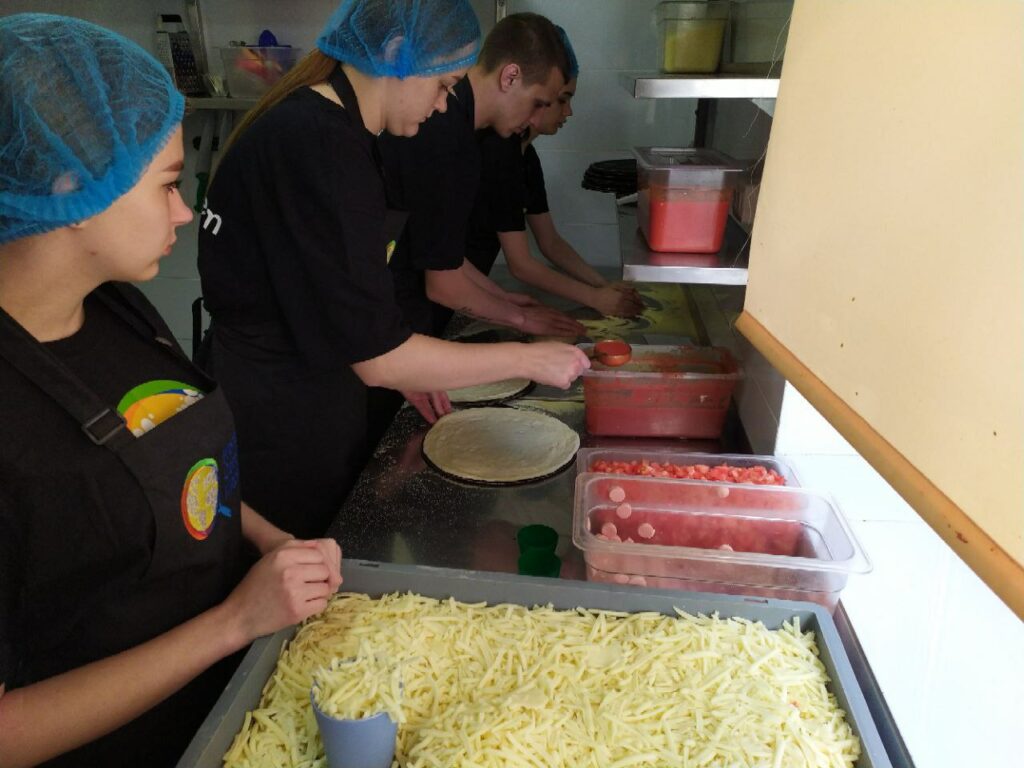
It took several days to pack the equipment from the Myrnograd pizzeria and take it to a warehouse in Dnipro. The equipment from the Pokrovsk pizzeria was packed in a hurry. At the same time, they continued to work and feed the needy. Everything they earned was spent on equipment for the military on the front line.
The entrepreneur decided not to wait till the war ended, but to open a pizzeria closer to the center of Ukraine. He considered 8 cities in the Kirovohrad, Dnipropetrovsk, Zhytomyr,and Khmelnytskyi regions.
While they were looking for premises, in May, a pizzeria opened in Dnipro and continued their good work. It was not the usual format of a profit-making establishment. They neither make custom-made pizzas nor accept visitors.
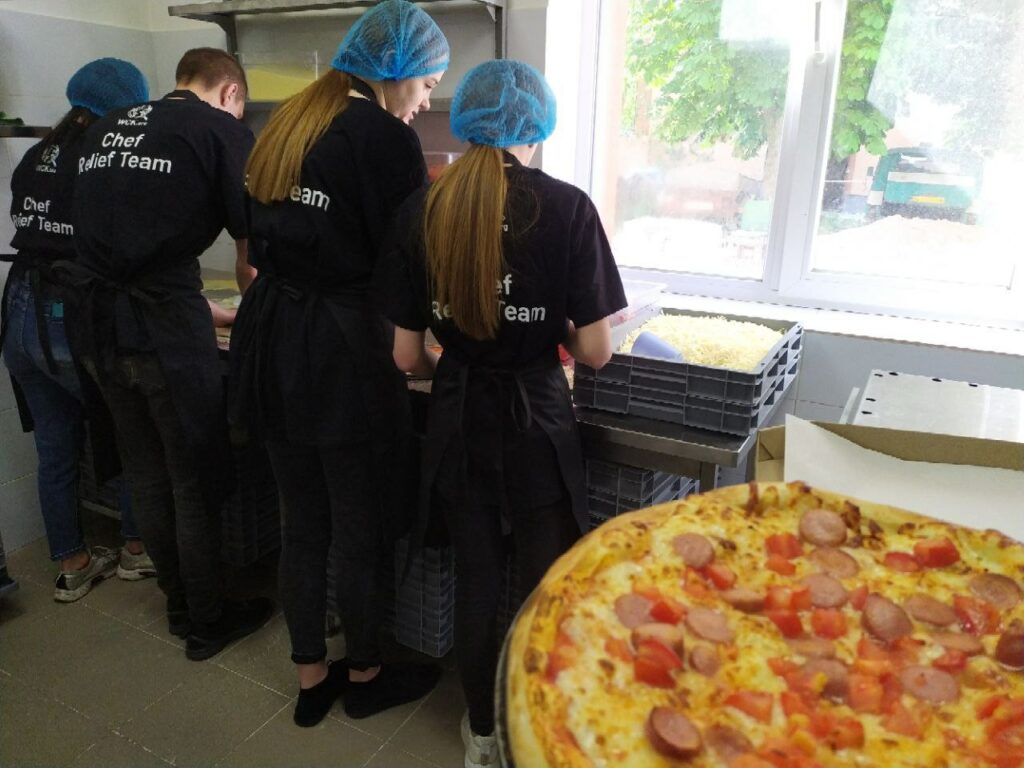
In a new place, the entrepreneur and his team bake up to 500 pizzas a day and take them to the Donetsk region to people hiding from shelling in shelters or basements or staying in hospitals. They deliver pizza from Dnipro to the Donetsk region twice a day; since they keep in touch with the local authorities of Pokrovsk and Myrnograd, they know exactly where they are needed most.
In Dnipro, they managed to find a space where a kitchen used to be. They did not need to do repairs or reconstruction – they just brought in the equipment, set everything up and started production. Previously, the menu included up to 30 types of pizza, now there are only two, but they make a lot of those pizzas. Products are purchased in Dnipro stores and from local entrepreneurs.
“Because of the war, there are some supply problems. We cannot make many different pizza types requiring different cheeses, smoked meats, and seafood. That is why our team developed a new recipe. It is quite simple, but at the same time it has all the ingredients – mozzarella, bacon, tomatoes,” Ihor says.
They work with the support of the World Central Kitchen – an international organization that helps public catering establishments that feed people for free. For example, in three weeks, the team prepared more than 26,000 portions of food for the needy.
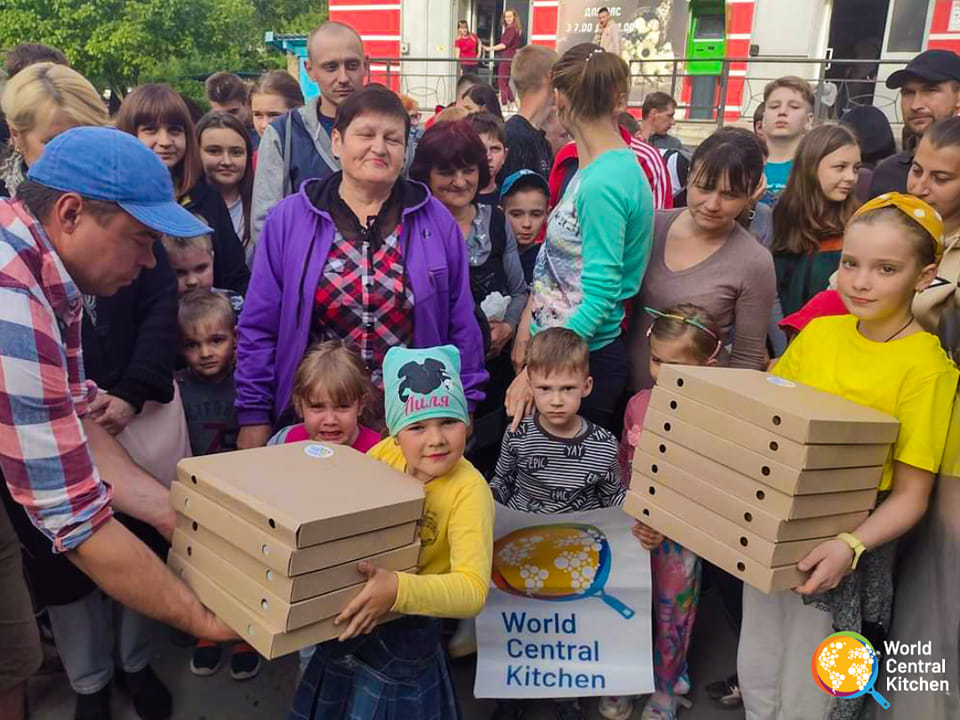
“Now there are a lot of people who need help. Many are out of work and homes. Every day we see long queues of people who come to the relevant humanitarian aid centers. We can’t feed everyone, but we try to,” Ihor Vynogradov says.
All photos are provided by the heroes of the stories
Olha Nikulina
11.07.2022
The material is prepared within the project “Countering Disinformation in Southern and Eastern Ukraine” funded by the European Union.


